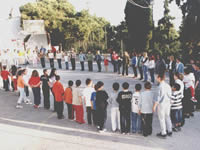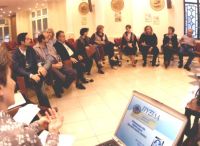 |
| PYXIDA's Activities
Prevention programs for school communities
|
 |
|
  PYXIDA,
since 1998, runs prevention programs for all education sectors.
Contemporary studies and research confirm that the systematic
running of prevention programs in schools can prevent discourages
young people from the abuse of addictive substances (cigarettes,
alcohol and illegal substances).This happens especially when
the programs are aimed in educating students at acquiring skills. PYXIDA,
since 1998, runs prevention programs for all education sectors.
Contemporary studies and research confirm that the systematic
running of prevention programs in schools can prevent discourages
young people from the abuse of addictive substances (cigarettes,
alcohol and illegal substances).This happens especially when
the programs are aimed in educating students at acquiring skills.
School is an appropriate place for preventative intervention,
since it gives us the opportunity:
- to reach all children, starting from a pre school age,
-to systematically apply long term prevention programs and health
education lessons, (which educate children at acquiring life
skills),
-to identify children and young people who ‘"flirt"’
with drugs and who might be in danger,
-to help children to gain a more realistic view about the prevalence
of drugs and to create conservative beliefs about the acceptability
of drug use.
-to train and to support teachers in their educative role, as
well as in their effort to confront and to support students
facing psychological and social problems and
-to encourage a better cooperation between teachers and parents,
since this helps greatly in the healthy development of the child.
In detail,
the prevention programs in schools include:
Child Care-Preps
-Information and education of staff, in relation to issues of
mental health and behavior of children
- Counseling support of educators and prep school teachers in
order to be able to face behavioral problems of infants
- Informative activities for parents addressing psychosocial
issues of pre school age
-Parents groups counseling aiming at strengthening the parental
role and the prevention of problems
- Encouraging the cooperation of parents and educators
- Publications aiming at informing parents for important issues
at this age (e,g, the separation of the child from his or her
family when s/he goes to Child Care)
Primary
Schools:
-Continue education and training of teachers in the implementation
of health education programs and in special child development
issues
- Support for the running of health education programs for students
(aiming at training in life skills)
- Activities for students and publications aiming at informing
students
- Informing parents regarding child psychology issues
- Parental groups counseling aiming at strengthening the parental
role
- Encouraging the cooperation between parents and teachers
  High
Schools-Year 7 to Year 9 High
Schools-Year 7 to Year 9
-Training the teachers in the implementation of prevention programs
with students
- Educational programs for secondary school teachers specializing
in teenage hood issues (e.g. aggression, sexuality, drug use
and others)
- Training teachers in active learning methods
- Holding informative discussions with parents in relation to
issues of teenage hood and prevention of addiction
- Informative discussions with students aiming at strengthening
their views against drug abuse
- Special programs aiming at supporting students with behavioral
problems in the classroom (programs that are taking place in
school groups)
- Publications for students
High Schools-Year
10 to Year 12/Technical Education Schools
-Training teachers in the adoption of health education programs
with students (e.g. addiction prevention programs, strengthening
mental health and communication)
- Educating teachers in the “teaching” of preventing drug addiction
-Counseling support to Teachers Associations in relation to
facing issues of drug abuse in schools
- Holding informative discussions with students
- Supporting school activities aiming at sensitizing the school
community
- Publications for students
  Tertiary
Students: Tertiary
Students:
Groups of personal development for tertiary students and information
about the effects of use of psychoactive substances
Prevention programs for the wider society
The prevention and the advancement of health is not only the
responsibility of scientists, it also requires the cooperation
and the contribution of all those who determine and participate
in social life.
For the formation of a society that is responsive to the deeper
needs of people, the self initiative of its members and their
participation as volunteers is of the outmost importance.
Programs for elected local government officials and
education, sports, culture and other officials
- Informative lectures and one day seminars focusing on the
formation of policies that encourage the abstention of young
people from psychodrastic substances.
-Educational seminars for local government officials addressing
the issue of addiction.
Parental Counseling
-Informing parents for the various stages of child development
and the psychic and emotional needs of every age, as well as
informing about the factors that influence the use of substances
and other dangerous behavior.
- Helping parents provide emotional support to their children
- Helping parents to set clear rules in the family and enhance
their negotiation skills
- Sensitizing parents in strategies that would increase family
attachment
-Supporting parents through their interaction with other parents.
Programs for health professionals in Counseling
Services, Health Centers etc
- Education regarding addiction prevention and support in developing
prevention and health advancement activities
- Involve them actively in prevention
Youth
Programs
- Informing and sensitizing bodies (sports clubs, cultural associations
etc) that target young people
- Educating officials
- Creative workshops for young people
- Educating officials in order to organize activities for the
advancement of health
Volunteer groups for
the health promotion
- Supporting the creation of volunteer groups for the health
promotion
- Educating and providing continues support to volunteer activities
for the prevention of addiction and for the health promotion
in the neighborhood and in the wider community.
Also:
- Providing counseling guidance in order to be able to face
addiction problems or other psycho-social problems
- Publications
- Public awareness campaigns in the media
- Research in cooperation with universities and research organizations
-Implementation of national and European projects
return to previous page
|
|
 |
|
|
|

